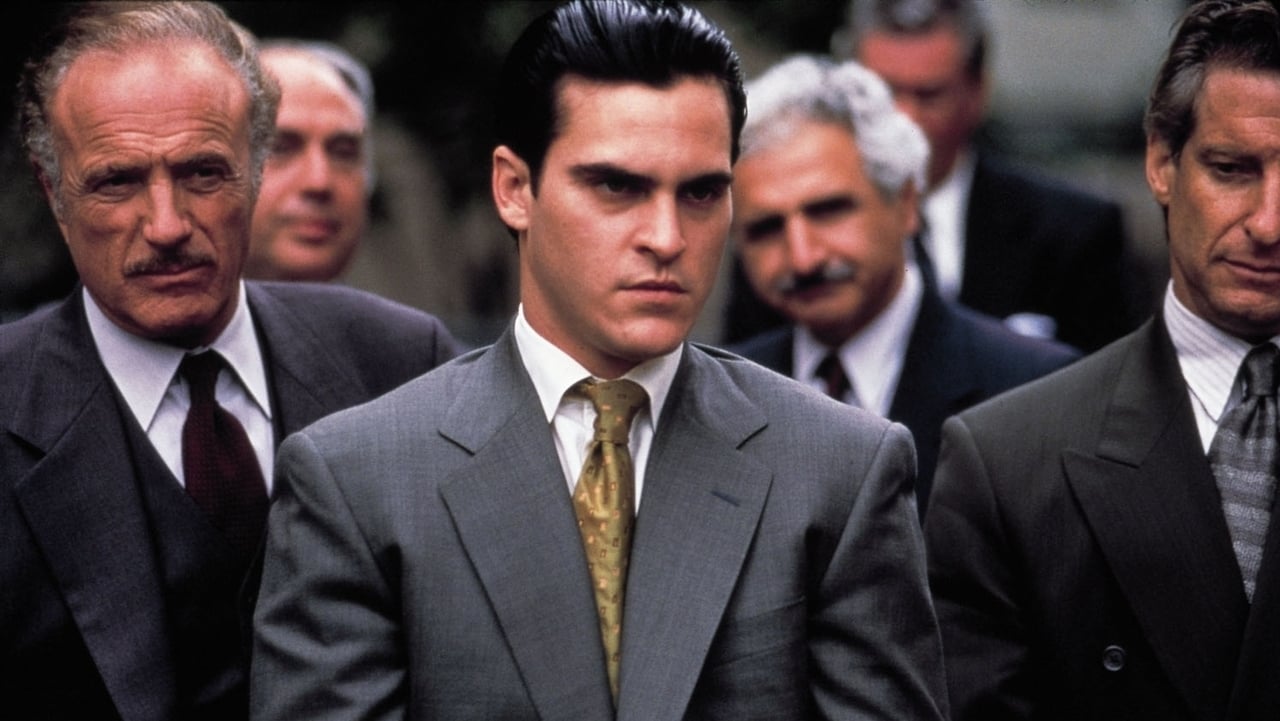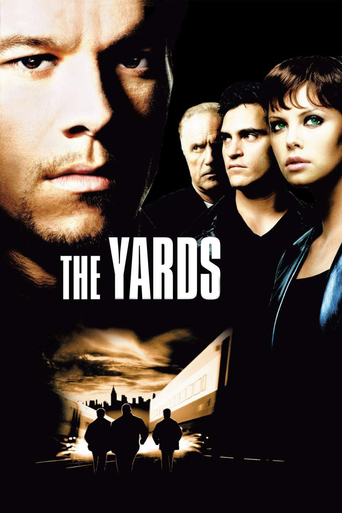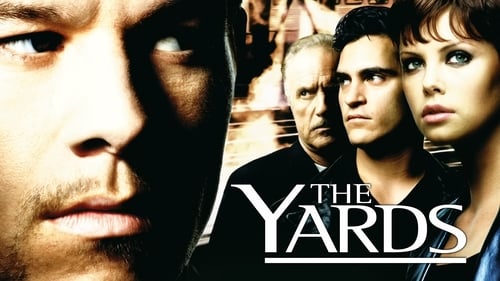



Wonderful character development!
Truly Dreadful Film
A story that's too fascinating to pass by...
The movie's neither hopeful in contrived ways, nor hopeless in different contrived ways. Somehow it manages to be wonderful
View MoreThree years in prison and out on parole, attractive and muscular Mark Wahlberg (as Leo Handler) rides the New York City subway to his home in Queens. His mother and friends have a surprise "Welcome Home, Leo" party for Mr. Walberg, with his best pal Joaquin Phoenix (as Willie Gutierrez) and girlfriend Charlize Theron (as Erica Soltz) in attendance. Walberg's goal is to get a good job and stay out of trouble. Fat chance You know when Walberg glances at a cop on the subway where this story is going. In this type of movie, the hapless hero is reluctantly drawn back into a life of crime. This usually begins when the star agrees to assist a friend's criminal activity – in a relative safe position, such as a "lookout" or driver. Then, something goes terribly wrong. A mother's heart is broken. The young men fight over the girl. Police are involved – and, if an officer gets hurt, there could be hell to pay..."The Yards" may not have been the best title for this crime drama. It refers to New York City's railroad yards, where subway trains are maintained.Written (with Matt Reeves) and directed by James Gray, the story follows very familiar tracks. Having characters play out a fairly predictable plot is not necessarily bad – but you do expect some significant deviations. The most striking may be that Ms. Theron's make-up and manners seem way too hip for her character and the setting. With blue-black shellac in his hair, Mr. Phoenix appears like the 1950s "Elvis". Wahlberg delivers moody doom well for Mr. Gray. There is good support from shady businessman James Caan (as Frank Olchin). He and Gray are obviously going from "On the Waterfront" to "The Godfather" in the scene where Mr. Caan discusses "business" with his associates. Ellen Burstyn is fine in a small part, but Faye Dunaway has nothing much to do in an even smaller role. Vegas-style singer Steve Lawrence (as Arthur Mydanick) is very effective. Harris Savides' photography is stylish."The Yards" is circulated with different edits. Thematically bracketing the opening, the "theatrical version" version is superior to the "director's cut".****** The Yards (4/27/00) James Gray ~ Mark Wahlberg, Joaquin Phoenix, Charlize Theron, James Caan
View MoreThis is a review of "Little Odessa", "The Yards" and "We Own the Night", three crime dramas by director James Gray.Released in 1994, "Little Odessa" stars Tim Roth as Joshua Shapira, a volatile criminal who has been exiled by his family. A "prodigal son returns" narrative, the film watches as Roth returns to his family home. Though his relatives still distrust him, Joshua is idolised by his younger brother, little Reuben Shapira (Edward Furlong). The film ends, as most "prodigal son" tales do, with Reuben dying, paying for his brother's sins."Little Odessa" was Gray's debut. It's a very good drama, well acted by the always electric Tim Roth, but the film's ethnic details are unconvincing and Gray falters in his final act with an obvious, overblown sequence in which little Reuben is accidentally gunned down.Gray followed "Odessa" up with "The Yards" (2000), a crime drama set in the commuter rail yards of New York City. The film's structure is similar to "Odessa", and sees Mark Wahlberg playing an ex-convict who returns home after a short stint in prison. Wahlberg attempts to stay clean, to keep his nose out of crime, but is drawn back into the criminal underworld by a friend played by Joaquin Phoenix. The film retains the "brotherhood dynamics" of "Odessa", Wahlberg playing the "good son" who eventually turns on his suffocating sibling. Once again the film ends with a ridiculously over-the-top death sequence.While "The Yards" has a certain, smothering pretentiousness about it, convinced about its own importance (it's lit like Rembrandt, street fights are filmed like Visconti's "Rocco and His Brothers" and it's reaching for the tone of Coppola's "The Godfather"), Gray nevertheless cooks up some wonderful strokes, like a beautifully sensitive welcome-home party, a wordless assassination attempt and a fine, aching performance by Wahlberg. It's a great mixed bag.Gray then directed "We Own The Night", arguably his best crime flick. The "good brother/bad brother" motif returns, this time with Mark Wahlberg and Joaquin Phoenix playing a pair of brothers on either side of the law. Phoenix's a perpetually high playboy who owns a nightclub frequented by drug-runners and mafia types, and Wahlberg's a straight-arrow cop trying to keep the streets clean. When the mafia unleashes an assassination campaign on local cops, Phoenix switches allegiances, goes undercover and attempts to take down the mob. There are touches of "Donnie Brasco", "Rush", "Point Break", "Serpico", "State of Grace", "Infernal Affairs" and every other "undercover cop" movie you can think of, but the film is beautifully lit, is atypically straight-faced and features a superb, rain-soaked car chase.Some have suggested that Gray's trilogy should be celebrated for working in a "classical", almost conventionally Greek mould. That his conventionality suggests that all his characters are at the mercy of already in place contours, their fates forgone. Mostly, though, Gray's trilogy highlights the ways in which contemporary artists have struggled to conceive of a response to postmodernism. The crime movies of, say, Tarantino and Scorsese, are unashamedly postmodern, toying with and regurgitating clichés from 1930s Warner machine gun operas and MGM crime flicks. They aren't about "crime", so much as they're pastiche jobs, jazzed up films about crime films. As a response to this aesthetic, artists who deem themselves "serious", who rightfully ask "what exactly comes next?", tend to look backwards at what came before, as though post-war modernism, by virtue of being modernism, is intrinsically "the solution". This leads to classically shot and written but wholly regressive fare like Gray's trilogy, which essentially unscrambles the world's Scorseses and Tarantinos and puts you right back in the 1940s, minus the irony and flippancy.But you can't go backwards in this way; your audience will always be ten steps ahead and there will always be a huge chasm between your solemnity and the tired insights your film delivers. This is why true progressive works in the genre, for example fare like "The Wire", which actively attempts a cognitive mapping of both global capitalism and crime, are neither modernist or postmodern, whilst possessing the vital traits of both. Philosophers have alternatively coined this new movement "neoprimitivism", "pseudomodernism", "participatism", "post-post modernism", but the one that seems to be sticking is "new modernism".Whatever you call it, this hypothetical movement rejects postmodern nihilism (nothing matters, there is no "truth", it's just a film), actively tries to convey the complexities of our world, and covertly believes that it is possible and necessary for individuals to make value judgements, take stands, approach objectivity, and back facts up. It is modernist in its desires to "understand", "teach", "decipher" and "make better" the world, and in its emphasis on culture, society, technology and politics. The movement doesn't reject postmodernism, but co-opts its tropes and bends them to suit its aim, questioning agency, subjectivity and attempting to piece together the fragments and multiple perspectives that typify complex systems. In short, truly relevant crime films simultaneously simulate our contemporary environment of junk, noise, commerce and static, before proceeding to decode, organise and target roots. As William Gibson said way back in the 1980s, future great artist will function like search engines, mapping and making sense of the detritus. Gray goes backwards to when there was less noise.7.9/10 - Worth one viewing.
View MoreSpeaking to the blu-ray transfer of this movie, this is one of the sorriest transfers I've seen. Echo Bridge Entertainment took the wide format of this movie and chopped 30% of it off entirely. I wonder why Miramax would allow them to butcher the movie like this. It's a disgrace. The movie was shot in 2.39:1 ratio but you won't see that much of the film since Echo Bridge Entertainment decided you don't need to see the entire film. They issued it in 1.78:1 ratio which is like redirecting the movie. Cheesy distribution companies like Echo Bride should be run out of the movie business entirely rather than be allowed to destroy an otherwise good film from a good cast. Read the review here by Blu-ray.com and see how the film was butchered by Echo Bridge. I say don't buy this one. Maybe it will be re-released by some other company in the future, someone who holds film more sacred. Unfortunately Echo Bridge is not such a company.
View MoreThe Yards is one of those films that's pretty good as long as you don't think too hard about it. It has some great performances and a strong build-up, but the story doesn't really work and the whole thing sort of flames out and sputters to its conclusion.Leo Handler (Mark Wahlberg) is a young man fresh out of prison and returning to his family. Leo is neither well educated nor particularly bright, but he is hopeful of getting a job with his Aunt Kitty's (Faye Dunaway) new husband. Frank Olchin (James Caan) runs a subway car manufacturing company and strongly urges Leo to get the training to qualify for a good union job. That would take a few years, though, so Leo decides to throw in with his best friend Willy Gutierrez (Joaquin Phoenix). Willy is essentially Frank's bag man, handling the payoffs, petty larcenies and sabotage that are the seedy underbelly of doing business in the city. But when a nighttime trip to vandalize a competitor's subway cars goes murderously wrong, Leo becomes the linchpin of a scandal that could destroy his family or cost him his life.There's a lot to like about this somber and quiet tale, chiefly the work of this fine cast. Mark Wahlberg as an actor has, I believe the phrase is, a "limited instrument". Put him in the right role and he can be electric. Put him in the wrong role and you get something like Wahlberg him in the Planet of the Apes remake. Leo is the right sort of role. Wahlberg's common, uncomplicated performance provides a clear window into the corrupt world of Frank and Willy. James Caan is pitch perfect as a man who is aware of the criminality at the heart of his business but believes he and his family can glide harmlessly over it. Joaquin Phoenix plays Willy as a successful version of Leo; a street kid who thinks he's making good. Phoenix, however, has a greater depth of talent and is able to show the audience far more as Willy's life falls apart. If he and Wahlberg had switched roles, Phoenix could have still shined but Wahlberg would have been a fiasco as Willy.The distaff side of The Yards doesn't get as much to do but manage to do as much as they can. Charlize Theron plays Erica, Leo's cousin and Willy's girlfriend. The character isn't much more than a plot device that takes off its shirt, but Theron gives her much more depth than she really deserves. Ellen Burstyn as Leo's mother is, again, more of a tool to get Leo through the story. Faye Dunaway as Erica's mom and Frank's wife does get just a little sliver of substance in her role. Plotwise, Aunt Kitty is largely just an obstacle but she also embodies one of the themes of the story. Kitty married a rich man to try and give herself and her daughter a better life. Yet Frank's wealth only disguises the fact that he and his world are exactly the things Kitty was trying to get away from.The Yards is also a decent take on the subject of big city graft and how that sort of corruption persists year after year. It's not really an organized conspiracy. It's just people making self-serving deals and trying to get a leg up in what they see as an unfair world.But as I mentioned, you can't think too hard about any of this stuff. For example, there's a section of the plot where the only way it could happen is if the entire police force were made up of utter morons and there's a big cover-up that, if you consider it logically, couldn't possible cover anything up. The ending also feels off. Everything is tied up a bit too neatly, both in circumstance and morally. It's like a happy ending glued onto a sad story.The Yards mixes family drama and urban venality into a tasty stew, but the proportions are not quite right. It's a fine meal that could have, and probably should have, been better.
View More